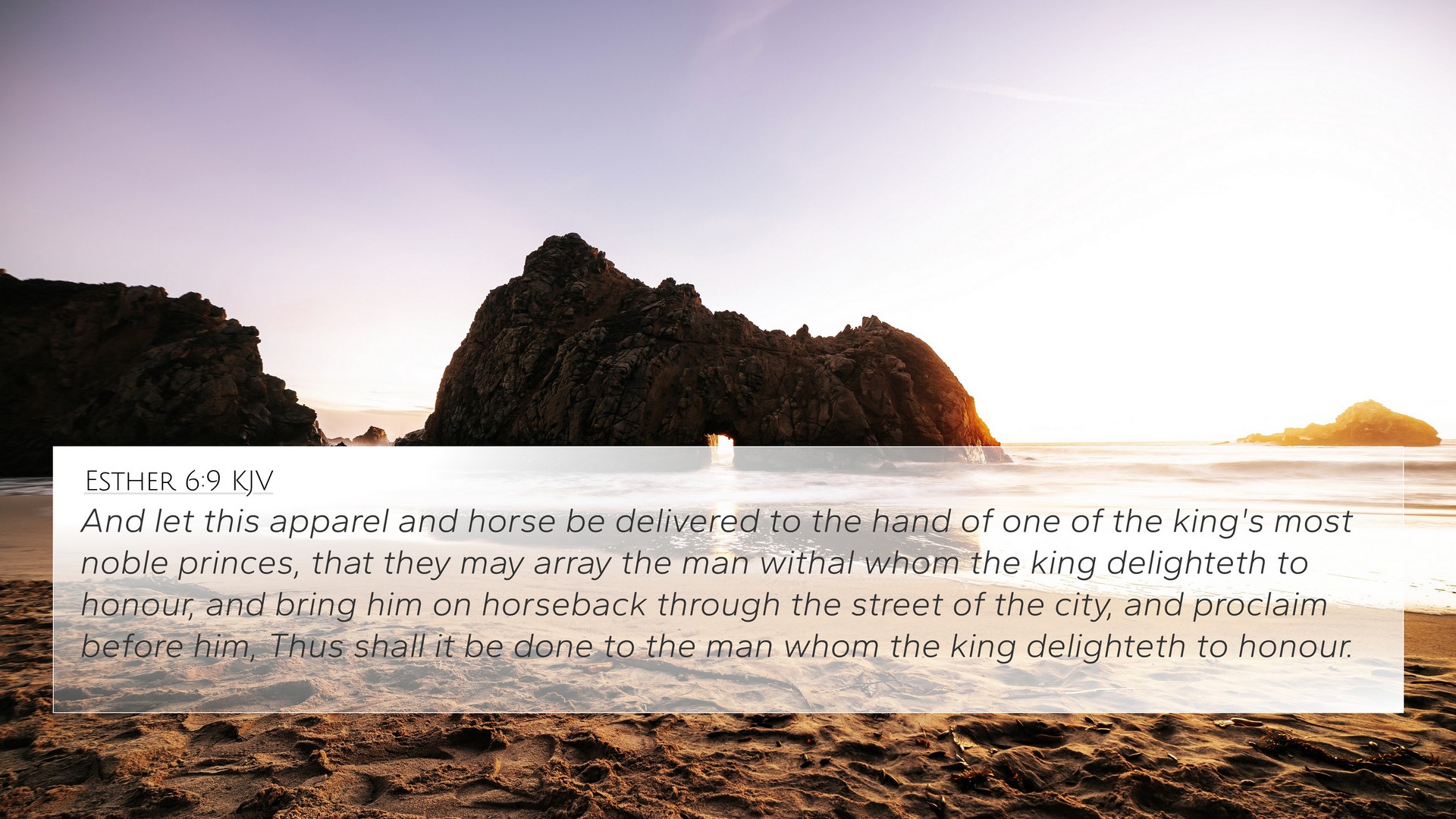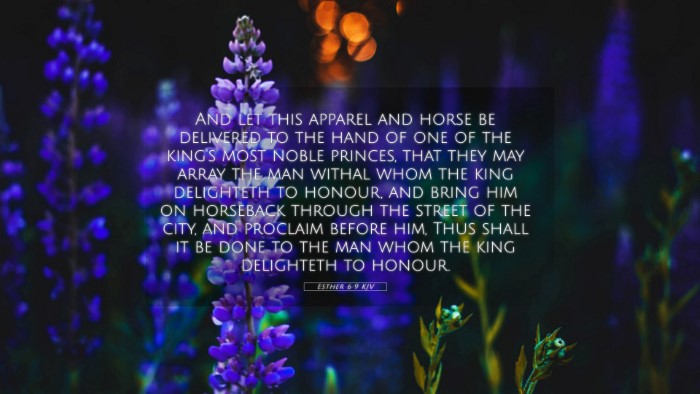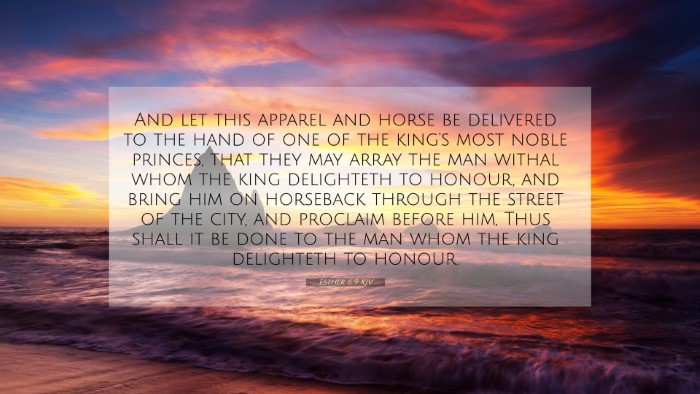Old Testament
Genesis Exodus Leviticus Numbers Deuteronomy Joshua Judges Ruth 1 Samuel 2 Samuel 1 Kings 2 Kings 1 Chronicles 2 Chronicles Ezra Nehemiah Esther Job Psalms Proverbs Ecclesiastes Song of Solomon Isaiah Jeremiah Lamentations Ezekiel Daniel Hosea Joel Amos Obadiah Jonah Micah Nahum Habakkuk Zephaniah Haggai Zechariah MalachiEsther 6:9 Similar Verses
Esther 6:9 Cross References
And let this apparel and horse be delivered to the hand of one of the king's most noble princes, that they may array the man withal whom the king delighteth to honour, and bring him on horseback through the street of the city, and proclaim before him, Thus shall it be done to the man whom the king delighteth to honour.
Uncover the Rich Themes and Topics of This Bible Verse
Listed below are the Bible themes associated with Esther 6:9. We invite you to explore each theme to gain deeper insights into the Scriptures.
Esther 6:9 Cross Reference Verses
This section features a detailed cross-reference designed to enrich your understanding of the Scriptures. Below, you will find carefully selected verses that echo the themes and teachings related to Esther 6:9 KJV. Click on any image to explore detailed analyses of related Bible verses and uncover deeper theological insights.
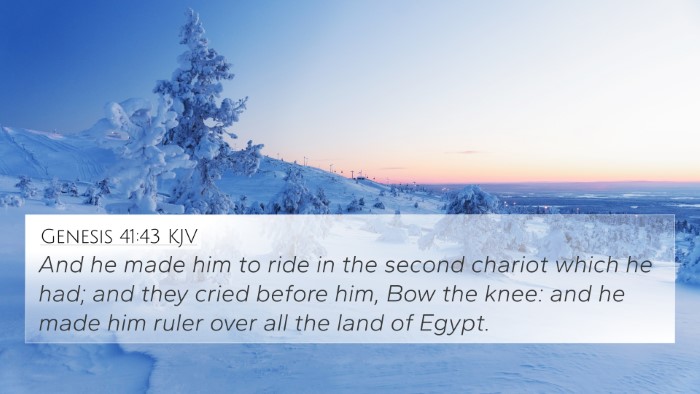
Genesis 41:43 (KJV) »
And he made him to ride in the second chariot which he had; and they cried before him, Bow the knee: and he made him ruler over all the land of Egypt.
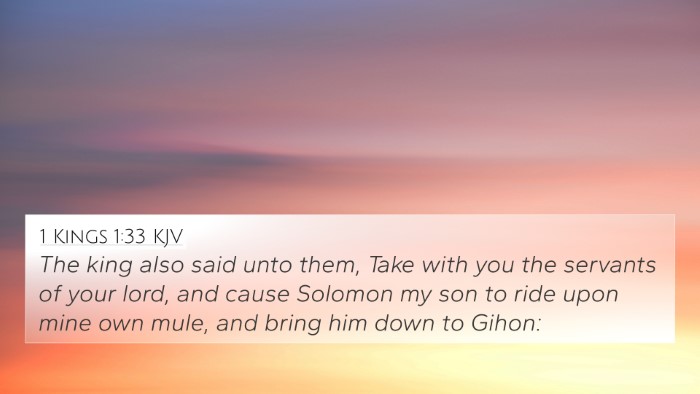
1 Kings 1:33 (KJV) »
The king also said unto them, Take with you the servants of your lord, and cause Solomon my son to ride upon mine own mule, and bring him down to Gihon:
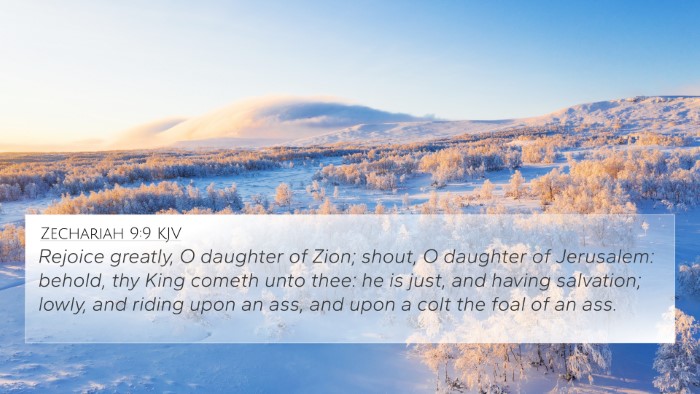
Zechariah 9:9 (KJV) »
Rejoice greatly, O daughter of Zion; shout, O daughter of Jerusalem: behold, thy King cometh unto thee: he is just, and having salvation; lowly, and riding upon an ass, and upon a colt the foal of an ass.
Esther 6:9 Verse Analysis and Similar Verses
Understanding Esther 6:9
Esther 6:9 states: "And let this apparel and horse be delivered to the hand of one of the king's most noble princes, that they may array the man withal whom the king delighteth to honor, and bring him on horseback through the street of the city, and proclaim before him, Thus shall it be done unto the man whom the king delighteth to honor."
This passage takes place during a pivotal moment in the Book of Esther, where Haman is being tasked with honoring Mordecai without knowing that his enemy is the very one he must honor.
Verse Meaning and Interpretation
In analyzing this verse, several themes and interpretations emerge based on insights drawn from various public domain commentaries:
- Divine Irony: The command to honor Mordecai comes from the king unknowingly through Haman, illustrating divine providence and irony (Matthew Henry).
- Role of Honor: The act of public honor is significant in the royal culture, signifying approval and respect. Haman's role in this act highlights his downfall (Albert Barnes).
- Contrast of Characters: Mordecai, a humble Jew, is contrasted with Haman, a proud noble, demonstrating God's elevation of the humble (Adam Clarke).
- Prophetic Fulfillment: This event may represent a prophetic element where the humble are lifted up, a consistent theme throughout scripture (Henry).
- Nature of Authority: The king's decree shows that earthly powers can be manipulated for divine purposes, reminding readers of God’s ultimate sovereignty (Barnes).
- Public Reversal: Haman's public humiliation through his forced action against Mordecai serves as a moral lesson on the fate of the wicked (Clarke).
- Theme of Honor and Dishonor: The contrast leads to an exploration of what true honor means in the sight of God, juxtaposed against worldly honor (Henry).
Cross References
Esther 6:9 is interconnected with various scripture passages that illuminate its meaning and reinforce its themes:
- Proverbs 16:18: "Pride goes before destruction, and a haughty spirit before a fall." - This juxtaposition emphasizes the downfall of Haman’s pride.
- Matthew 23:12: "Whoever exalts himself will be humbled, and whoever humbles himself will be exalted." - A direct link to the theme of humility and honor.
- 1 Peter 5:6: "Humble yourselves, therefore, under God's mighty hand, that he may lift you up in due time." - A New Testament reflection on the reward of humility.
- Job 5:11: "He sets on high those who are lowly, and those who mourn are lifted to safety." - Reflects God’s tendency to uplift the humble.
- Psalm 75:7: "But it is God who judges: He brings one down, he exalts another." - Emphasizes God’s control over honor and authority.
- Luke 14:11: "For all those who exalt themselves will be humbled, and those who humble themselves will be exalted." - A teaching of Christ echoing the same sentiment as in Proverbs.
- Galatians 6:7: "Do not be deceived: God cannot be mocked. A man reaps what he sows." - Points to the consequences of Haman's actions.
Thematic Connections
This verse and its surrounding context offer valuable insights for thematic Bible verse connections:
- Theme of Divine Justice: The shifting fortunes of Haman and Mordecai illustrate God's justice in action.
- Humility vs. Pride: Central to this narrative, the stark contrast between the proud and the humble underlines moral lessons inherent in biblical narratives.
- God’s Sovereignty: The unfolding events confirm the belief in God's sovereign rule even in earthly affairs.
- Courage and Honor: Mordecai’s earlier refusal to bow to Haman becomes all the more poignant with this divine twist of fate.
- Faith and Trust: Esther’s faith plays a crucial role, and this moment of honor signals a turning point born from her courage.
Application and Reflection
As we reflect on Esther 6:9, several applications can be found for contemporary believers:
- Integrity in Honor: How we honor others reflects our character; we must strive to do so with integrity.
- Trust in Divine Timing: Like Mordecai, we may be waiting for God’s timing; we must trust His plans.
- Beware of Pride: The story serves as a reminder of the dangers of pride and the ultimate justice that follows.
- Encouragement to the Humble: Believers should find solace in knowing that God sees and elevates the humble.
- Engagement in God’s Story: Each of us is part of a larger narrative where our actions, much like Esther’s, can have significant impacts.
Conclusion
Esther 6:9 is a vivid illustration of God’s providential hand in the lives of His people. By examining this verse through various biblical lenses and cross-references, we find a deeper understanding of character, justice, and the workings of societal structures under the sovereignty of God. The divine irony presented, where Haman performs honors for Mordecai, reflects God’s way of flipping the narrative for His glory. Believers today can take encouragement from this verse, knowing that humility is ultimately honored by God.
